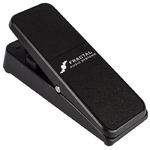Always consult the official Owners Manuals first
Wah block
Jump to navigation
Jump to search
_TOC_

Contents
- 1 Wah: supported by which Fractal Audio products?
- 2 Wah models
- 3 X/Y switching in the Wah block
- 4 Position of the Wah block
- 5 Preventing thump when engaging the Wah
- 6 Tracking parameter in the Wah block
- 7 FAT parameter in the Wah block
- 8 Auto-engaging the Wah
- 9 Creating a Seek Wah
- 10 Creating an Auto Wah
- 11 Various Wah tips
Wah: supported by which Fractal Audio products?
- Axe-Fx II: yes.
- AX8: yes.
- FX8: yes.
Wah models
- Current types available in the Wah block:
- FAS Standard – equivalent to the “Bandpass” setting in earlier firmware.
- Clyde – based on an original Vox Clyde McCoy wah.
- Cry Babe – based on a Dunlop Cry Baby.
- VX846 – based on a Vox V846-HW handwired wah.
- Color-Tone – based on a Colorsound wah.
- Funk – modeled after the “Shaft” sound.
- Mortal – based on a Morley wah/wolume pedal.
- VX485 - based on a Vox V845.
- Pictures of the real Wah pedal equivalents, by MDProd.
X/Y switching in the Wah block
- Axe-Fx II: yes.
- AX8: yes.
- FX8: yes.
Position of the Wah block
- The Wah block is usually placed before the Amp block. Unless you want to sound like Tom Morello, in which case it should be placed after the Amp block.
Preventing thump when engaging the Wah
- Cliff (answering a question about hearing a thump when auto-engaging a wah): "The thump isn't the wah, it's the Input Impedance changing. If your preset is set to Auto for the Input Z, when you engage the wah the impedance switches. This causes a slight thump if you are playing since the load on your guitar changes. If you want to avoid this, turn Input Impedance to 1M OHM." source
- Cliff: "Set the Input-Z on the preset to 1M rather than Auto. The reason the Wah engages abruptly is because it switches the input impedance. Setting Input-Z to 1M overrides the impedance switch (and, frankly, sounds better IMO)." source
- The AX8's Input Impedance is fixed at 1 MOhm.
Tracking parameter in the Wah block
- Cliff: "Tracking controls how much the Q changes with the Control knob. The Q in a wah is not constant. The amount of Q change varies from brand-to-brand and model-to-model. It even varies between identical models due to component tolerances." source
- Cry Baby model tip: decrease Tracking to make the wah type sound more "vowel". source
FAT parameter in the Wah block
- Cliff: "FAT is actually a mix control. It adds dry signal so you can't ever get 100% dry. At max FAT it's 50/50." source
Auto-engaging the Wah
- Just like an optical wah pedal, you can engage the Wah automatically when moving the pedal. This is especially handy when using a spring-loaded pedal. To accomplish this, set Auto-Engage in the modifier menu to either a speed-controlled or position-controlled setting. More about Auto-Engage.
- If you want the Wah to be bypassed automatically at toe-down position (simulating a virtual toe switch), instead of heel-down, set OFF VAL in the modifier menu to 95%.

Creating a Seek Wah
- The "Seek Wah" is a pedal by Z.VEX, which uses a sequenced filter pattern. For an equivalent effect, try the Random Wah factory preset. For a more pronounced effect, try adding a Formant filter, attched to the same controller.
Creating an Auto Wah
Various Wah tips
- Decreasing MAX FREQ often helps to make a high gain wah tone cut better through the mix.
- Copying frequency range settings from manufacturer's manuals helps emulating specific wah pedals.